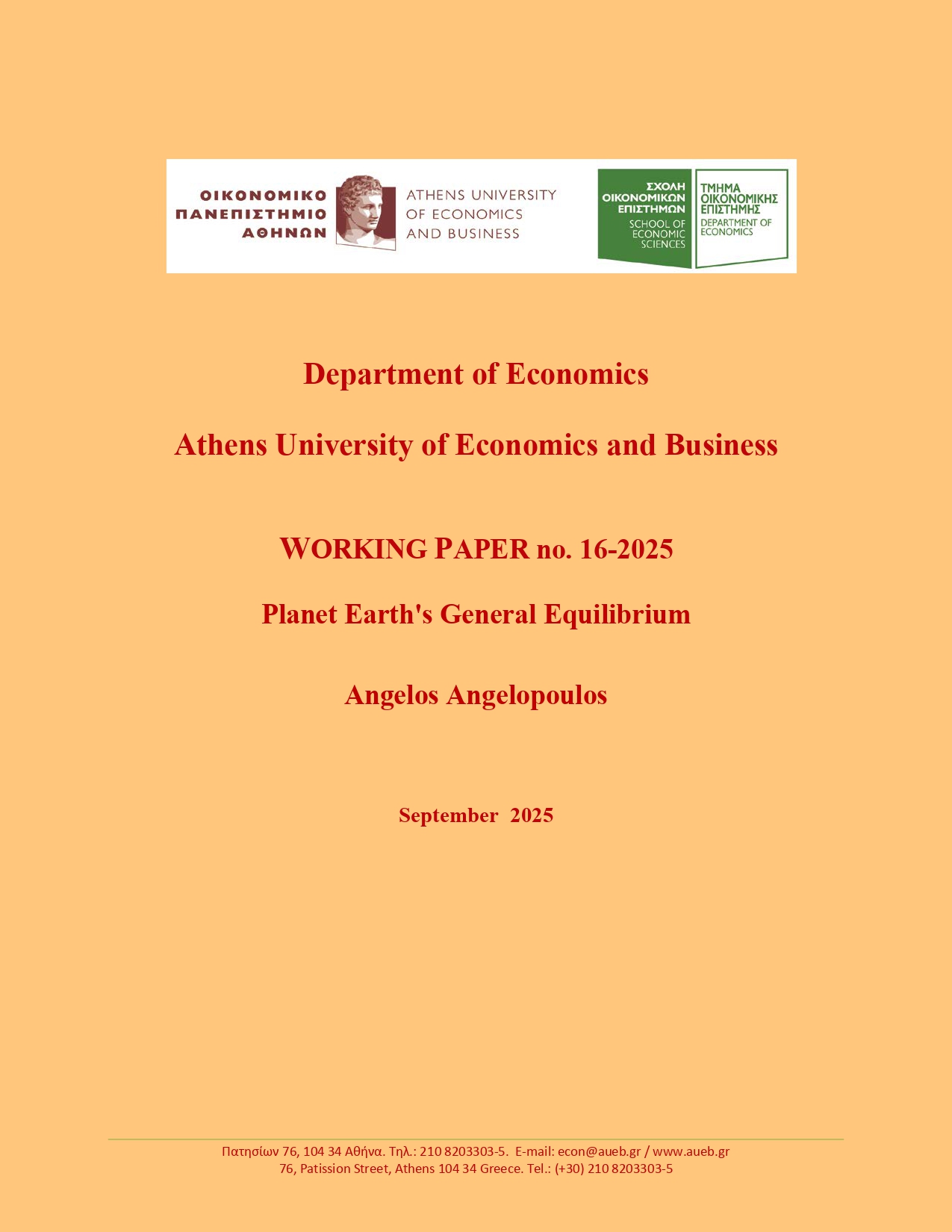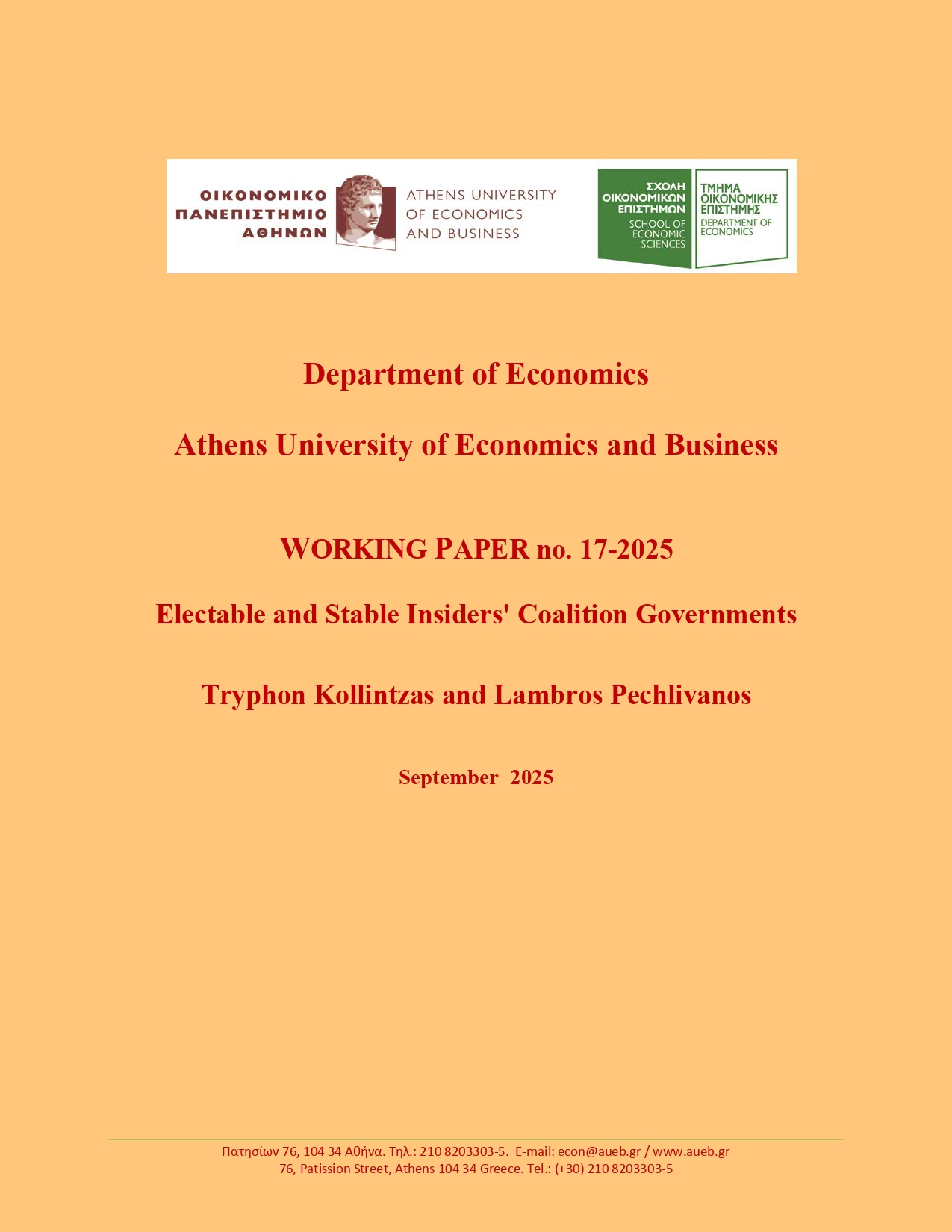Ανάρτηση Ερευνητικών Δοκιμίων no 16/25 & no 17/25
 Ερευνητικό Δοκίμιο no 16/25 με τίτλο "Planet Earth's General Equilibrium"
Ερευνητικό Δοκίμιο no 16/25 με τίτλο "Planet Earth's General Equilibrium"
του Άγγελου Αγγελόπουλου
Περίληψη
If the reproductive mechanism and the criminal behaviour of the earths inhabitants are exogenously put under control (by laws, regulations, institutions and policies such as educational reforms), then our planet is to be repeatedly found in an optimal (in the sense of maximising the whole populations utilitarian welfare) and temporarily steady balance, likewise, in an ex ante to ex post stable general equilibrium, among two opposite sides or forces, in between the existence or the survival of humanity is placed. The one is the endogenous-optimal food and water supplies of people, which are consumed (thus, get gradually extinct) with some (endogenous) general equilib rium rates, in xed proportions. The other is the endogenous-optimal environment (i.e., the nature) and the endogenous-optimal energy (that is sourced and emitted from the non-renewable natural resources) of the earth, which, both, determine our food and water balances, by being destroyed (or exacerbated) and extracted-or-used (or depleted), respectively, with their own (endogenous) general equilibrium rates, under a reasonable pre-agreed rule. During the realisation of this optimal balancing process, the earths random climate (deterioration) renders the attainment of this general equilibrium risky, but the correct or rational (namely, the without estimation or expectation errors) prediction of the climate change does not dampen the general equilibrium outcome, when moving from the ex ante to the ex post instant of time.
O Άγγελος Αγγελόπουλος είναι Εντεταλμένος Διδάσκοντας στο τμήμα Οικονομικής Επιστήμης του Οικονομικού Πανεπιστημίου Αθηνών.
 Ερευνητικό Δοκίμιο no 17/25 με τίτλο "Electable and Stable Insiders' Coalition Governments"
Ερευνητικό Δοκίμιο no 17/25 με τίτλο "Electable and Stable Insiders' Coalition Governments"
των Λάμπρου Πεχλιβάνου και Τρύφωνα Κολλίντζα
Περίληψη
In this paper, we formulate a general equilibrium theory that explains the existence and stability of democratically elected governments that support certain groups of individuals in society (insiders) to the detriment of everybody else (outsiders), even if the latter constitute a majority. The vehicle is a dynamic general equilibrium model, where insiders get monopoly rents and outsiders get less than what they would have gotten under a common good regime. We construct such political economy equilibria and we identify the conditions under which such political regimes (coalitions of insiders): (a) can safeguard against opportunistic behavior (i.e., do not fall from within) and (b) may come to power in the rst place (i.e., manage to get elected). To that end, we highlight the role of ideology or self-serving bias employed by populists' mode and tone of debate as a gluing device to garner an electable coalition
Ο Λάμπρος Πεχλιβάνος είναι Επίκουρος Καθηγητής του τμήματο Διεθνών και Ευρωπαϊκών Οικονομικών Σπουδών του Οικονομικού Πανεπιστημίου Αθηνών και ο Τρύφωνας Κολλίντζας είναι Ομότιμος Καθηγητής του τμήματος Οικονομικής Επιστήμης του Οικονομικού Πανεπιστημίου Αθηνών.





 Πατησίων 76
Πατησίων 76 2108203 303
2108203 303
